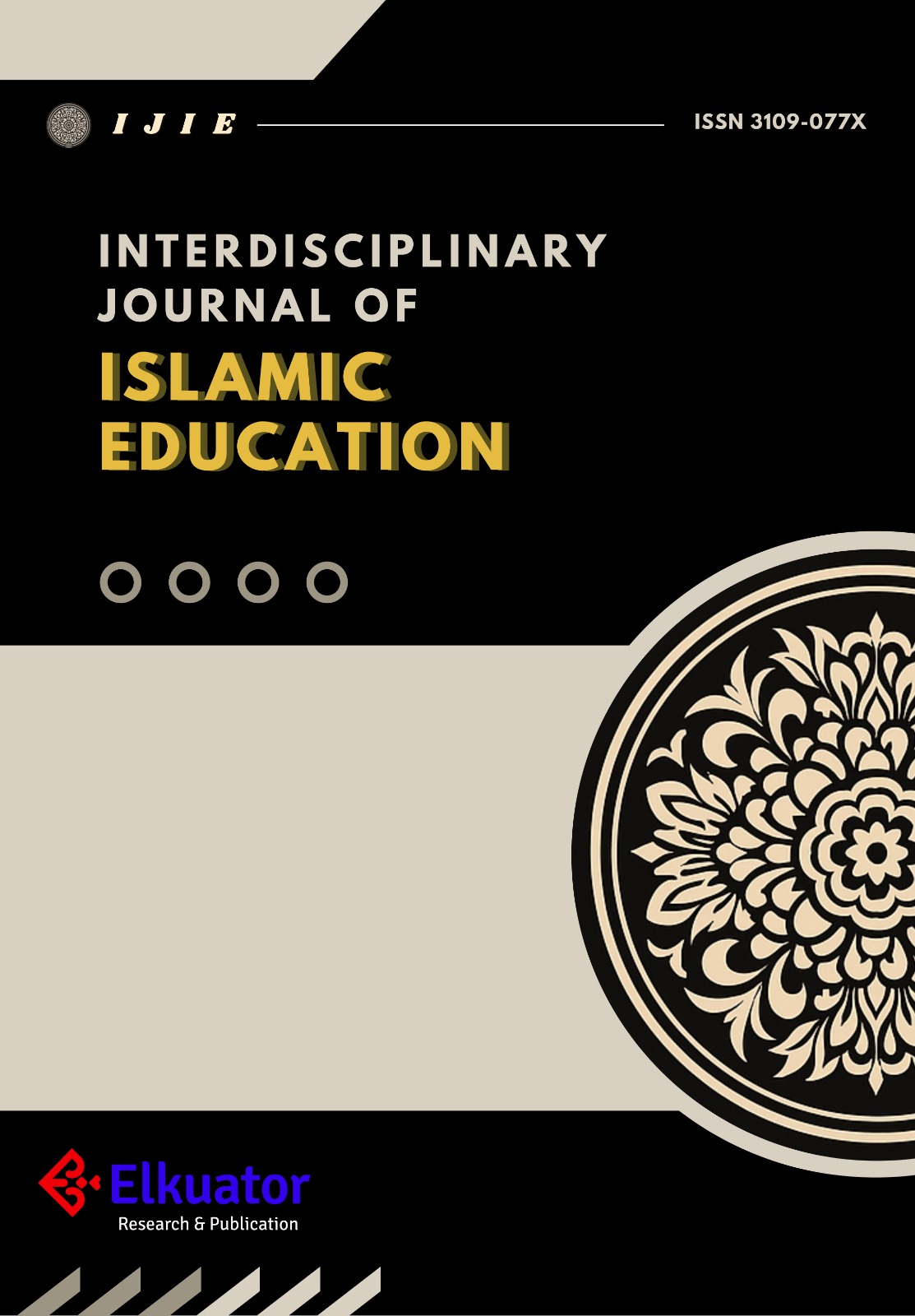The Curriculum of Islamic Educational Institutions Integrated with Local Wisdom
DOI:
https://doi.org/10.24260/ijie.1.1.62Keywords:
Islamic Educational Institutions, Curriculum, Local Wisdom, National curriculum, IntegrationAbstract
A curriculum, like a map, is not merely a route to knowledge it also reflects who we are and where we come from. Thus, the development of Islamic educational institutions cannot occur in isolation; it must be interwoven with the broader fabric of life. This study is grounded in the belief that active participation from various stakeholders, local communities, village clerics, dedicated teachers, parents who offer silent prayers, and local governments is essential to ensure that the curriculum becomes more than a formal document. It should instead become a living, breathing entity within the learning environment. Utilising a systematic approach, this research applies rigorous screening based on inclusion and exclusion criteria and draws from scholarly databases. The findings reveal that integrating local wisdom into the curriculum of Islamic educational institutions not only deepens students’ religious understanding but also cultivates social awareness, ethical values, and interpersonal skills. Academically, this has significant implications for the development of culturally rooted curricula, context-based teaching methodologies, and character education grounded in local traditions. Designing educational experiences in Islamic institutions with local wisdom as their foundation is not merely about adding customary elements to religious teachings. Rather, it requires synthesis a convergence of traditional values and divine guidance, ensuring that neither negates the other, but instead mutually reinforces both. In conclusion, a curriculum based on local wisdom imbues the learning process with new meaning: it becomes more contextual, grounded, and ultimately more capable of shaping students' comprehension of the religious and cultural values that thrive in their own native soil.
References
Afif, N. (2022). Islamic Education Based on Local Wisdom and Its Implementation of the Independent Learning Curriculum. Islamic Education: Journal of Islamic Education, 11(03), 1041. https://doi.org/10.30868/ei.v11i03.3177
Andini, D. R., & Sirozi, M. (2024). Integration of Local Wisdom in Islamic Education Curriculum Development Planning. Journal of Innovation, Evaluation and Development of Learning (JIEPP), 4(3), 465–471. https://doi.org/10.54371/jiepp.v4i3.566
Andriana, T. (2024). PAI Learning Based on Local Wisdom. JOURNAL OF EDUCATION, 2(2).
Ardiansyah, Risnita, & Jailani, M. S. (2023). Data Collection Techniques and Educational Scientific Research Instruments on Qualitative and Quantitative Approaches. Journal of IHSAN: Journal of Islamic Education, 1(2), 1–9. https://doi.org/10.61104/ihsan.v1i2.57
Arifin, S. (2020). Curriculum Management Based on Local Wisdom at Madrasah Tsanawiyah Al-Ishlah Jenggawah Jember Academic Year 2019/2020. Jember State Islamic Religious Institute.
As'ari, H. (2024). Development of a Local Wisdom-Based Islamic Religious Education Curriculum Model for Secondary Schools in Rural Areas. UNISAN JOURNAL, 3(2), 717–726.
De Gomes, F., & Sidi, Y. (2022). Implementation of curriculum content development based on Manggarai local wisdom at Bunda Maria Grazia Early Childhood Education. NANAEKE: Indonesian Journal of Early Childhood Education, 5(1), 63–69. https://doi.org/10.24252/nananeke.v5i1.27602
Fathurrozi, F. (2023). Harmony in Islamic Boarding Schools, a multicultural education model based on local wisdom. Innovative: Journal Of Social Science Research, 3(6), 10222–10237.
Febriyanni, R., Sari, N. A., & Syarifah. (2022). Teacher Career Development Management in Improving the Quality of Education in MIN 1 Langkat. Journal of the Center for the Study of People's Education, 2.
Firmansyah, R. (2024). Islamic Education Based on Local Wisdom Perspective of Azyumardi Azra [Undergraduate Thesis]. University of Muhammadiyah Malang.
Harahap, S. M., & Hamka, H. (2023). Investigating the roles of philosophy, culture, language and Islam in Angkola’s local wisdom of ‘Dalihan Na Tolu.’ HTS Teologiese Studies / Theological Studies, 79(1). https://doi.org/10.4102/hts.v79i1.8164
Hasibuan, H. A. (2022). The role of local wisdom-based modules to support independent learning education. Basic Education Proceedings, 1.
Husni, H. (2024). Development of the PAI curriculum based on local wisdom. AL-MIKRAJ Journal of Islamic Studies and Humanities (E-ISSN 2745-4584), 4(02), 1334–1346. https://doi.org/10.37680/almikraj.v4i02.5231
Inayati, F., Kurahman, O. T., & Rusmana, D. (2024). Analisis Integrasi Nilai Kearifan Lokal dalam Pembelajaran Pendidikan Agama Islam. Journal of Creative Student Research, 2(6), 182–189. https://doi.org/10.55606/jcsr-politama.v2i6.4621
Latifah, S. (2023). Manajemen Kurikulum Berbasis Kearifan Lokal (1 ed.). PT Arr rad Pratama.
Lidi, M. W., Mbia Wae, V. P. S., & Umbu Kaleka, M. B. (2022). Implementasi Etnosains Dalam Pembelajaran Ipa Untuk Mewujudkan Merdeka Belajar Di Kabupaten Ende. OPTIKA: Jurnal Pendidikan Fisika, 6(2), 206–216. https://doi.org/10.37478/optika.v6i2.2218
Musyafak, M., & Subhi, M. R. (2023). Strategi Pembelajaran Pendidikan Agama Islam dalam Menghadapi Tantangan di Era Revolusi Industri 5.0. Asian Journal of Islamic Studies and Da’wah, 1(2), 373–398. https://doi.org/10.58578/ajisd.v1i2.2109
Nudiati, D., & Sudiapermana, E. (2020). Literasi Sebagai Kecakapan Hidup Abad 21 Pada Mahasiswa. Indonesian Journal of Learning Education and Counseling, 3(1). https://doi.org/10.31960/ijolec.v3i1.561
Nurohman, M. A., Wakib Kurniawan, & Dedi Andrianto. (2024). Transformasi Kurikulum Pendidikan Islam Berbasis Kearifan Lokal. Crossroad Research Journal, 55–80. https://doi.org/10.61402/crj.v1i4.179
Parmin, P., Savitri, E. N., Khusniati, M., & El Islami, R. A. Z. (2022). The prospective science teachers’ skills in reconstructing indigenous knowledge of local culture on breast milk using pare (Momordica charantia). International Journal of Educational Research Open, 3, 100193. https://doi.org/10.1016/j.ijedro.2022.100193
Rahayu, Y. (2023). Curriculum Problems in Elementary Schools. Pendas : Scientific Journal of Basic Education, 8(1), 3176–3187. https://doi.org/10.23969/jp.v8i1.8594
Rahmayanti, M., Kusdiana, A., & Nugraha, A. (2018). Development of Teaching Materials for Writing Learning Based on Local Wisdom Through Language Games in Elementary Schools. PEDADIDTIKA: Scientific Journal of Elementary School Teacher Education, 5(3).
Rispan, R. & Ajat Sudrajat. (2019). Integration of Kalosara Local Wisdom Values in History Learning in High School as Strengthening Student Character. Journal of History Education, 8(2), 148–169. https://doi.org/10.21009/JPS.082.04
Siratjudin, S., & Dewi, D. E. C. (2024). Development of Islamic Religious Education Curriculum as an Effort to Strengthen Religious Values Based on Local Wisdom in Kaur Regency, Bengkulu. JPT: Journal of Thematic Education, 5(1), 155–165.
Suryadi, S., & Jasiah, J. (2023). Transformation of basic education through local wisdom: A qualitative approach to curriculum development. Wiyata Dharma: Journal of Educational Research and Evaluation, 11(2), 163–170. https://doi.org/10.30738/wd.v11i2.17109
Susanto, Y. K., Rudyanto, A., & Rahayuningsih, D. A. (2022). Redefining the Concept of Local Wisdom-Based CSR and Its Practice. Sustainability, 14(19), 12069. https://doi.org/10.3390/su141912069
Uktolseja, N. F., Nisa, A. F., Arafik, M., Wiarsih, N., & Belitong, S. A. A. (2022). Instilling Pancasila Student Profile Values Through Project-Based Thematic Learning in Elementary Schools. Proceedings of the National Seminar on Elementary School Teacher Education.
Wahyuni, N. S., Nasrullah, F., Fauziyah, N., Sobariah, S., Hidayatuloh, A. A., Saepulah, S., & Bahri, A. S. (t.t.). The implementation of Islamic religious education based on local wisdom in facing social dynamics in Ibun District. Indonesian Journal of Education: Theory, Research, and Innovation, 5(2), 2025.
Walad, M., Nasri, U., Hakim, M. I., & Zulkifli, Muh. (2025). Integration of Local Wisdom Values in Religious Education: Transformation of Religious Character. Scientific Journal of Citra Bakti Education, 12(1), 265–277. https://doi.org/10.38048/jipcb.v12i1.4676
Waruwu, M. (2024). Research and Development (R&D) Methods: Concepts, Types, Stages and Advantages. Scientific Journal of the Education Profession, 9(2), 1220–1230. https://doi.org/10.29303/jipp.v9i2.2141
Yulianti, H., & Nisa, A. F. (2023). Curriculum Based on Local Wisdom in Elementary Schools. In Proceedings of the National Seminar on Education, 1(2).
Yuniarti, N. F., & Sirozi, M. (2024). Local Wisdom-Based Planning for Improving the Competence of Islamic Religious Education Teachers. Ainara Journal (Journal of Research and PKM in the Field of Education), 5(3), 336–341. https://doi.org/10.54371/ainj.v5i3.568
Downloads
Published
Issue
Section
Copyright and License
Copyright (c) 2025 Andi Zalfa Nurjihan, Annisa Ainurahmah (Author)

This work is licensed under a Creative Commons Attribution-NonCommercial 4.0 International License.













